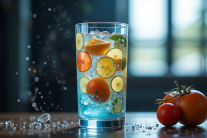Athletic performance isn’t just about training harder; it’s about fueling your body the right way. Your diet plays a crucial role in how well you perform, recover, and grow as an athlete. In this article, we will explore how to improve athletic performance with diet and provide practical tips you can start using today.
Why Diet Matters for Athletic Performance
Think of your body as a high-performance machine. To run efficiently, it needs the right fuel. Eating the wrong foods can lead to fatigue, poor recovery, and even injuries. On the other hand, a well-planned diet helps you:
- Boost energy levels
- Improve stamina
- Enhance muscle growth and repair
- Reduce recovery time
Key Components of a Performance-Boosting Diet
1. Carbohydrates: The Energy Powerhouse
Carbohydrates are your body’s primary energy source. When you exercise, your muscles use glycogen (stored carbs) for fuel. If glycogen levels are low, you’ll feel sluggish and weak.
- What to eat: Whole grains, fruits, vegetables, oats, and quinoa.
- When to eat: Focus on carbs before and after workouts. For endurance activities, load up on carbs a day or two in advance.
2. Proteins: The Building Blocks
Proteins are essential for muscle repair and growth. They also help in reducing soreness after intense workouts.
- What to eat: Lean meats, fish, eggs, tofu, beans, and Greek yogurt.
- When to eat: Include protein in every meal and snack. Post-workout is especially important for muscle recovery.
3. Fats: The Long-Lasting Fuel
Fats provide energy for prolonged, low-intensity exercises. They also support cell function and hormone production.
- What to eat: Avocados, nuts, seeds, olive oil, and fatty fish like salmon.
- When to eat: Spread your fat intake evenly throughout the day, but avoid heavy fatty meals right before exercise.
4. Vitamins and Minerals: The Unsung Heroes
Micronutrients like vitamins and minerals play a big role in energy production and overall performance.
- Key nutrients to focus on: Iron (for oxygen transport), calcium (for bone health), and magnesium (for muscle function).
- What to eat: Leafy greens, citrus fruits, nuts, dairy products, and fortified cereals.
5. Hydration: The Ultimate Game Changer
Dehydration can significantly reduce your performance. Even losing 2% of your body weight in fluids can lead to fatigue and slower reaction times.
- What to drink: Water is essential, but you can also include sports drinks for long workouts to replenish electrolytes.
- When to drink: Sip water throughout the day and increase intake before, during, and after exercise.
How to Time Your Meals for Maximum Performance
Before Exercise
- When: Eat 2-3 hours before exercising.
- What to eat: A balanced meal with carbs, protein, and a little fat. For example, brown rice with grilled chicken and vegetables.
During Exercise
For workouts lasting over an hour, consume easily digestible carbs to maintain energy levels. Options include bananas, energy gels, or a handful of dried fruits.
After Exercise
- When: Within 30-60 minutes post-workout.
- What to eat: A combination of protein and carbs. Try a smoothie with Greek yogurt, berries, and spinach.
Common Diet Mistakes to Avoid
1. Skipping Meals
Missing meals can leave you low on energy and affect your recovery.
2. Overeating Junk Food
Even if you’re training hard, indulging in too many unhealthy snacks can hinder your progress.
3. Ignoring Hydration
Many athletes focus on food but neglect water. Always prioritize hydration.
4. Following Fad Diets
Extreme diets might promise quick results but often lack the nutrients your body needs.
Supplementation: Do You Really Need It?
Supplements can help fill nutritional gaps, but they should not replace a balanced diet. Some popular options include:
- Protein powders: Great for post-workout recovery.
- Creatine: Can improve strength and endurance.
- Omega-3 fatty acids: Reduce inflammation and support joint health.
Always consult with a healthcare professional before starting any supplement regimen.
Personalizing Your Diet
Every athlete is unique. Factors like your sport, training intensity, body type, and goals will influence your dietary needs. Keep a food diary and track how different foods affect your performance.
Quick Tips for Success
- Plan meals ahead of time to avoid unhealthy choices.
- Use apps to track your macronutrients and water intake.
- Experiment with different foods during training, not on competition days.
Final Thoughts
Improving athletic performance with diet doesn’t have to be complicated. Start with small changes, like incorporating more whole foods, staying hydrated, and timing your meals better. Over time, these habits will add up and take your performance to the next level.
Ready to fuel your body for greatness? Explore advanced strategies and recipes to elevate your performance even further.





Post a comment